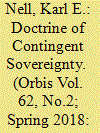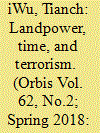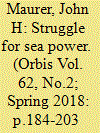|
|
|
Sort Order |
|
|
|
Items / Page
|
|
|
|
|
|
|
| Srl | Item |
| 1 |
ID:
162753


|
|
|
|
|
| Summary/Abstract |
Assessing the economic reality and prospects of the Soviet Union was of major importance for U.S. policy-making throughout the Cold War. In the future, the U.S. is likely to be faced with adversaries with similarly opaque command (or mixed command and free market) economies; accurately assessing their size and health will remain an important U.S. intelligence task. This task is generally seen as requiring the development of complex quantitative methodologies which, despite their necessary reliance on poor quality and perhaps manipulated data, produce an output that can appear “objective” and precise. This can be counteracted in part by focusing on the likely biases in the input date, as caused, for example, by the ulterior motives of those providing it. Furthermore, intelligence must constantly be searching for, and making use of, new sources of insights even if they are more subjective and less precise in nature.
|
|
|
|
|
|
|
|
|
|
|
|
|
|
|
|
| 2 |
ID:
162752


|
|
|
|
|
| Summary/Abstract |
A genesis and development of the conflict in Ukraine demonstrated fragility of the international security system and its inability to guard sovereignty of the smaller or weaker nations. By creating and then manipulating conflicts, Russia is gaining leverage over the decision making on political and economic development, governance issues, and the external alliances of those countries. By challenging sovereignty of smaller states, and forcibly changing their borders, Russia is challenging existing international order and the basic principles of Helsinki Final Act on Security and Co-operation in Europe of 1975, to which the Soviet Union, and its successor state, Russian Federation, are signatories. For the interests of global stability, it is a priority to bring Russia back to the framework of the Organization for Security and Co-Operation in Europe (OSCE) without any concessions on principles of sovereignty for all OSCE member states.
|
|
|
|
|
|
|
|
|
|
|
|
|
|
|
|
| 3 |
ID:
162758


|
|
|
|
|
| Summary/Abstract |
Disengagement of U.S. leadership in recent years has not only emboldened the world's worst actors, it has enabled the emergence of non-state groups such as the Islamic State of Iraq and al-Sham (ISIS) to threaten a new and ominous trend in international affairs—the pursuit of sovereign authority by transnational violent-extremists. Amending both the Clausewitzian “remarkable trinity” to explicitly encompass non-state actors in war and the balance-of-power praxis of Talleyrand to one favoring dynamic repair of failed and failing states in diplomacy, the Doctrine of Contingent Sovereignty proposed in this article provides the requisite tools for bolstering legitimacy of weakened states while simultaneously affording the necessary freedom-of-action for the United States to secure its vital national interests. Analogous to the Monroe Doctrine of the nineteenth-century, which put putative expansionist powers on notice, this new doctrine asserts that the privilege of sovereignty remains contingent upon adherence to accepted international norms of behavior.
|
|
|
|
|
|
|
|
|
|
|
|
|
|
|
|
| 4 |
ID:
162755


|
|
|
|
|
| Summary/Abstract |
Recently, there have been calls for the United States to unleash the offensive power of cyber space. Advocates contend that offense has the advantage in cyberspace. This article argues that cyberspace does not favor the offensive at either the tactical or the strategic level. In fact, a defensive doctrine has clear advantages over an offensive one. Support for this argument can be found in two unexpected sources: official statements of U.S. Army doctrine and Carl von Clausewitz's On War. This is surprising, given that scholars consider both the U.S. Army and Clausewitz diehard apostles of the cult of the offensive. This essay seeks to import their insights about the advantages of the defense into the virtual realm. When read carefully, U.S. Army doctrine and Clausewitz's classic text support the claim that defense is the stronger approach in the cyber realm.
|
|
|
|
|
|
|
|
|
|
|
|
|
|
|
|
| 5 |
ID:
162756


|
|
|
|
|
| Summary/Abstract |
The range of strategic ends and contingencies that could require seizing, securing, and controlling territory on land is not diminishing. But the means of employing landpower have repeatedly exhausted the domestic basis and political will to sustain it over time, as in Vietnam, Iraq, and Afghanistan. A way of applying landpower that allows for the essential element of time, sustainable over protracted periods in the court of public opinion, would offer immeasurable strategic value. Drawing on the author's work and observations while deployed to the U.S./coalition headquarters in command of military operations against ISIS, this article suggests that the answer to the dilemma of landpower, however preliminary, lies at the nexus of strategy and cost.
|
|
|
|
|
|
|
|
|
|
|
|
|
|
|
|
| 6 |
ID:
162750


|
|
|
|
|
| Summary/Abstract |
The role played by the rule of law is crucial to a liberal democracy because it demarcates a central area of authority which separates civil society from the state, thus ensuring that the state will not over-reach and subjugate civil society, nor that civil society will recklessly pursue anarchy and plunge the regime into chaos. One of the prime examples of maintaining the rule of law lies in the presidency of Abraham Lincoln, who enforced the boundaries which restrained both the state and civil society under circumstances of the most extreme stress, namely, a civil war. Lincoln rebuffed secession as a species of anarchy, but he also restrained (though not without some mis-steps) the state from becoming oppressive, even as he successfully navigated the nation to reunion and restoration.
|
|
|
|
|
|
|
|
|
|
|
|
|
|
|
|
| 7 |
ID:
162754


|
|
|
|
|
| Summary/Abstract |
Russia's relations with North Korea are often ignored in the West. The conventional view is that Russia's role with respect to the North is purely political and diplomatic, predicated on Russia's permanent membership in the UN Security Council. Often overlooked is the fact that Russia maintains a range of economic links with the DPRK. Taken together, they constitute quite a substantial leverage that Russia can exercise over North Korea, when and if it chooses to do so. The paper aims to investigate the economic dimension of the Russia-North Korea relationship. The article also examines North Korea's domestic economic situation, mostly drawing upon Russian expert assessments.
|
|
|
|
|
|
|
|
|
|
|
|
|
|
|
|
| 8 |
ID:
162751


|
|
|
|
|
| Summary/Abstract |
The history of the contest for naval mastery during the Great War has particular resonance for today because the United States now faces a serious threat from China's increasing capabilities to wage war at sea. China's naval challenge calls into question America's continued command of the maritime commons. The stakes at risk for the United States in today's contest are just as high as they were a hundred years ago for Britain. Defeat at sea would wreck American global leadership in the twenty-first century just as surely as it would have meant the collapse of British power in the twentieth. What, then, can we learn from past struggles for sea power and America's entry into the First World War that offers guidance for understanding our current strategic predicament?
|
|
|
|
|
|
|
|
|
|
|
|
|
|
|
|
| 9 |
ID:
162757


|
|
|
|
|
| Summary/Abstract |
This article explores virtually planned attacks, an innovation by the Islamic State (IS) in its global campaign of terrorism. It argues that the United States and its allies have successfully combined military, intelligence, and law enforcement activities with border security measures in Turkey to reduce IS’ ability to send foreign fighters home to conduct attacks against the West. IS leaders have responded by relying on a team of virtual planners. These individuals use encrypted online messaging applications, such as Telegram Messaging or WhatsApp, to gather local recruits, provide them with technical expertise, and pick the target. Historically, virtually planned attacks in Europe and the United States have not been as successful as those executed by foreign fighters. But attacks in Southeast Asia may provide a forewarning of what is to come.
|
|
|
|
|
|
|
|
|
|
|
|
|
|
|
|
|
|
|
|
|